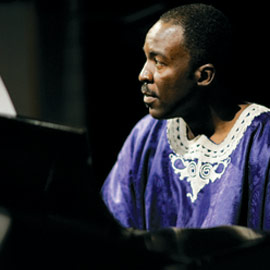|
Celebrating African Composers
Raised Between Two Cultures, a Musician Finds a Way to Bridge Them
To find inspiration for his current musical project, pianist
William Chapman Nyaho didn’t have to look beyond his own name.
  “The piano,” William
Chapman Nyaho explains, “is both percussive and melodic, which are
important elements of
African music.” “The piano,” William
Chapman Nyaho explains, “is both percussive and melodic, which are
important elements of
African music.” |
 |
“In the language of my father,” says Nyaho, who grew up in Ghana, West Africa, “Nyaho means ‘Remember your history.’” As an
award-winning educator and concert artist, Nyaho not only remembers his history but also shares it — through
works by classical composers of African descent.
In many genres of folk and popular music, composers from the African diaspora are well known. Not so in classical music — a situation Nyaho is working to change. “I think my calling
is to celebrate this music and bring it to the fore,” he says. The musician has released a CD of several works by African, African-American, and Afro-Caribbean composers (for most of them, it’s the only recording there is) and showcased
the music in concerts around the world.
Nyaho’s mission brought him to Seattle Pacific University in March 2005 as part of the
Lawrence and Ruth Schoenhals Symposium,
an endowed program that enables Free Methodist
colleges and universities to host Christian artists of national stature. In concert (aided by SPU faculty members and students), he presented
enthusiastic renditions of eight different composers’ works, ranging in style from accessible
and familiar to challenging
and complex.
Nyaho wasn’t always so at ease with this repertoire. While at boarding school in Ghana, he learned both Western piano literature and traditional African dance music, and for a long time felt torn between the two — even after completing his doctorate
in musical arts. During a 15-year teaching career, he sought out African classical music to include in his keyboard-literature courses. After accumulating precious copies of
unpublished or out-of-print works, he took a sabbatical to study them. That’s when the lights came on.
“I realized I was trying to filter this music from a Western point of view,” Nyaho says. So he put aside (temporarily, at least) Western music: “No Bach, no Chopin — it was a resolution,
almost. I had to stop playing anything else and just pound this music into my fingers.” Through this exercise, he was able to connect the notes on the page with the dance rhythms of his childhood. And in the process, he believes he integrated both sides of his musical background
for the first time.
That was only four years ago, and though Nyaho has accomplished much since then, he says he still has a lot to do. Currently he’s compiling an anthology of the works for publication by Oxford University Press. And he’s aiming high for the future. “There are 50 recordings of Chopin etudes,” he notes. “There need to be 50 recordings of these African pieces.” — BY MARTIN STILLION
Back to the top
Back to Home | 